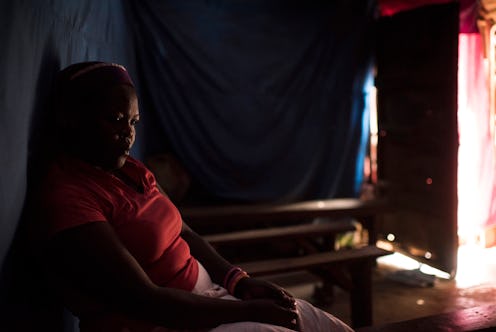News
This Clinic In Kenya Already Lost $2 Million In Funding Thanks To Trump's Global Gag Rule

In an interview with NPR on Wednesday, Kenyan reproductive health nurse Melvine Ouyo described how Donald Trump's Global Gag Rule on abortion has harmed Kenya's oldest reproductive and sexual health clinic after it refused to follow the policy. The policy, she said, has taken away of more than $2 million in funding from the medical organization since Trump signed the executive order.
The nurse, who works for Family Health Options Kenya (FHOK), said the organization suffered financial consequences almost immediately after refusing to comply with the Global Gag Rule, otherwise known as the "Mexico City Policy." On Jan. 23, 2017, Trump signed an executive order titled the Mexico City Policy; every single Republican president has signed the policy since Ronald Reagan in 1984.
The policy works on two levels. Firstly, it prohibits medical organizations from offering abortion as a service to its patients. Secondly, it orders that groups cannot "perform or actively promote abortion as a method of family planning in other nations." This also includes simply talking about abortion as an option for patients.
Under this rule, the United States has the power to cut funding for any organization abroad should it refuse to comply, essentially depriving it of the finances it needs to perform necessary medical services for local communities. NPR reported that while the full effect of this policy will only be known at the end of the U.S. fiscal year in September, organizations like FHOK that refuse to follow the policy have already lost funds that were allocated before Trump signed the order.
FHOK's clinical services director Amos Simpano told NPR that the group lost $640,000 in October 2017 after Trump's Emergency Plan for AIDS Relief cancelled further funding for FHOK. On top of that, the group lost another $1.56 million after it failed to renew a bid for U.S. financing. Simpano said the combined amount covered almost 60 percent of FHOK's funding.
The lack of money has caused the group to shut one of its 14 clinics down, according to Ouyo. "We had to lay off six staff [out of 10] just to be able to sustain the clinic. We also have not been able to acquire any [new] equipment in the past several months because of a lack of funding," she added.
The sudden drop in funding affects far more than access to abortion. The organization also can no longer carry "outreach services" to poor patients in struggling communities, which has affected around 76,000 girls and women, Ouyo told NPR. "Because we have not been able to provide outreach services, which basically serve disadvantaged communities, we cannot provide screening services for HIV and AIDS and be able to initiate treatment for those who test positive, and provide health education [for prevention]," she said. Locals, Ouyo added, have to live "without any precaution."
Children, too, could be hurt by the lack of funding. "A child who requires immunization and [whose] parents may not be able to afford transport to facilities [could] get communicable diseases — measles, TB, diphtheria, hepatitis. And if one gets it, they infect another and another in the community," Ouyo told NPR. "It feels painful knowing that someone would benefit from your education, your passion, your career, and you cannot do that. It kills your morale."
For now, Ouyo said that FHOK runs on an "alternative" through a grant from the International Planned Parenthood Foundation, which it's a member organization of. But she doesn't plan to give up. "Just like the previous years when we had the global gag order, I still have this hope that I have to hold on, to press on," Ouyo told NPR. "I am hopeful that someone will hear my cry."